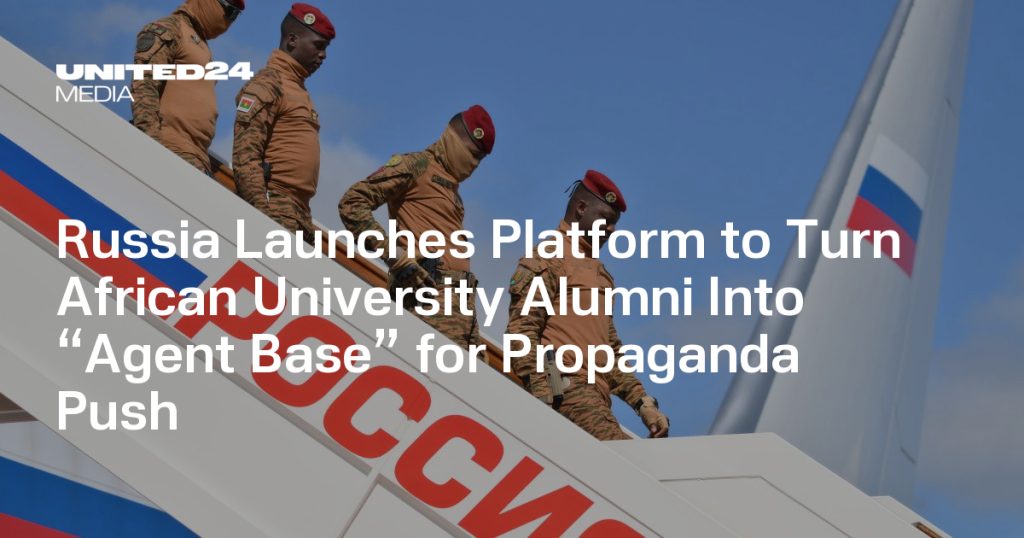Listen to the article
Russian authorities are intensifying efforts to establish a unified platform for African graduates of Russian universities, aiming to leverage these alumni as vectors of cultural and political influence across the African continent, according to recent reports.
Ukraine’s Center for Countering Disinformation (CCD) revealed on October 23 that Moscow is working to consolidate its connections with African graduates who completed their studies in Russia. The initiative appears designed to create a coordinated network that would promote the Russian language and cultivate a favorable image of Russia throughout Africa.
The proposal emerged during a conference titled “Russian language — the basis of integration dialogue in the CIS” and was subsequently circulated through a sanctioned resource known for disseminating Russian propaganda and influence operations in Africa, the CCD reported.
This strategic move represents a formalization of Russia’s long-standing use of educational opportunities as a soft power tool. By creating an institutional framework to maintain relationships with these graduates, Moscow aims to transform them into what the CCD describes as an “agent base” – a network of individuals positioned to advance pro-Russian narratives and help develop Russia-friendly elites within African nations.
“This is a sophisticated approach to building long-term influence networks,” said Dr. Olena Skomoroshchenko, an international relations expert at Kyiv National University. “By maintaining connections with graduates who often return to their countries to take positions in government, business, and academia, Russia creates a sustainable channel for projecting influence without direct intervention.”
The initiative comes as Russia has announced plans to increase the number of state-funded university placements available to students from African nations and North Korea. Moscow has also expressed willingness to offer free education to Afghan students, contingent upon approval from the Taliban regime.
Russia’s renewed focus on educational diplomacy in Africa builds upon Soviet-era traditions when thousands of African students received higher education in the USSR. Many of these graduates later assumed leadership positions in their home countries, creating lasting connections that Russia now seeks to revitalize and expand.
The timing of this effort coincides with Russia’s broader push to strengthen its presence in Africa amid growing geopolitical competition with Western nations and China. Since 2019, Russia has hosted two Russia-Africa summits, increased arms sales to the continent, and deployed private military contractors to several African states.
“Educational diplomacy offers Russia a relatively low-cost, high-impact method of cultivating influence,” noted Jonathan Felder, a researcher at the Council on Foreign Relations specializing in Russia-Africa relations. “Unlike military or economic aid, which requires significant resources, educational programs create deep personal connections and cultural affinity that can last generations.”
African students have traditionally been attracted to Russian universities due to scholarship opportunities, quality technical education, and historical ties. Russian degrees in engineering, medicine, and natural sciences remain highly regarded in many African countries.
However, critics warn that this educational outreach serves as a vehicle for extending Russian influence. The CCD’s report suggests that by institutionalizing its relationships with African alumni, Russia is creating a more structured approach to utilizing these networks for advancing its geopolitical interests.
“This represents a significant evolution in Russia’s approach to influence operations,” said Maria Avdeeva, research director at the European Expert Association. “Rather than ad-hoc engagement, Moscow is building a systematic framework for maintaining and activating these networks when needed.”
As competition for influence in Africa intensifies among global powers, Russia’s focus on educational ties highlights the diverse tools being deployed in this new scramble for African partnerships, extending well beyond traditional economic or military engagement to include deeper cultural and educational dimensions.
Fact Checker
Verify the accuracy of this article using The Disinformation Commission analysis and real-time sources.




8 Comments
It’s troubling to see Russia exploiting educational programs as a tool for propaganda. This could undermine the credibility of African universities and damage their relationships with international partners.
You make a good point. Russia’s actions jeopardize the integrity of academic institutions and threaten to sow division. Transparent, ethical practices in higher education should be a priority for all stakeholders.
I’m curious to learn more about the specific tactics and messaging Russia plans to employ through this alumni network. What narratives are they hoping to amplify, and how will they counter criticism of their authoritarian regime?
While concerning, this development is not entirely surprising. Russia has long sought to project its power and ideology beyond its borders, often through deceptive means. The international community must remain vigilant and coordinate efforts to counter these malign activities.
This is a concerning development. Russia seems to be doubling down on its efforts to spread disinformation and propaganda across Africa. Leveraging university alumni is a cunning tactic, but one that should be closely monitored and countered.
Agreed. Russia is clearly trying to expand its sphere of influence in Africa through manipulative means. The international community must remain vigilant and support initiatives to promote media literacy and fact-based reporting in the region.
This news highlights the importance of strengthening democratic institutions and media freedom across Africa. Exposing Russia’s malign influence efforts and empowering local voices will be crucial to safeguarding the continent’s long-term stability and prosperity.
Absolutely. Building resilient, independent media ecosystems is key to combating foreign disinformation campaigns. Governments, civil society, and international partners must work together to support quality journalism and critical thinking skills.